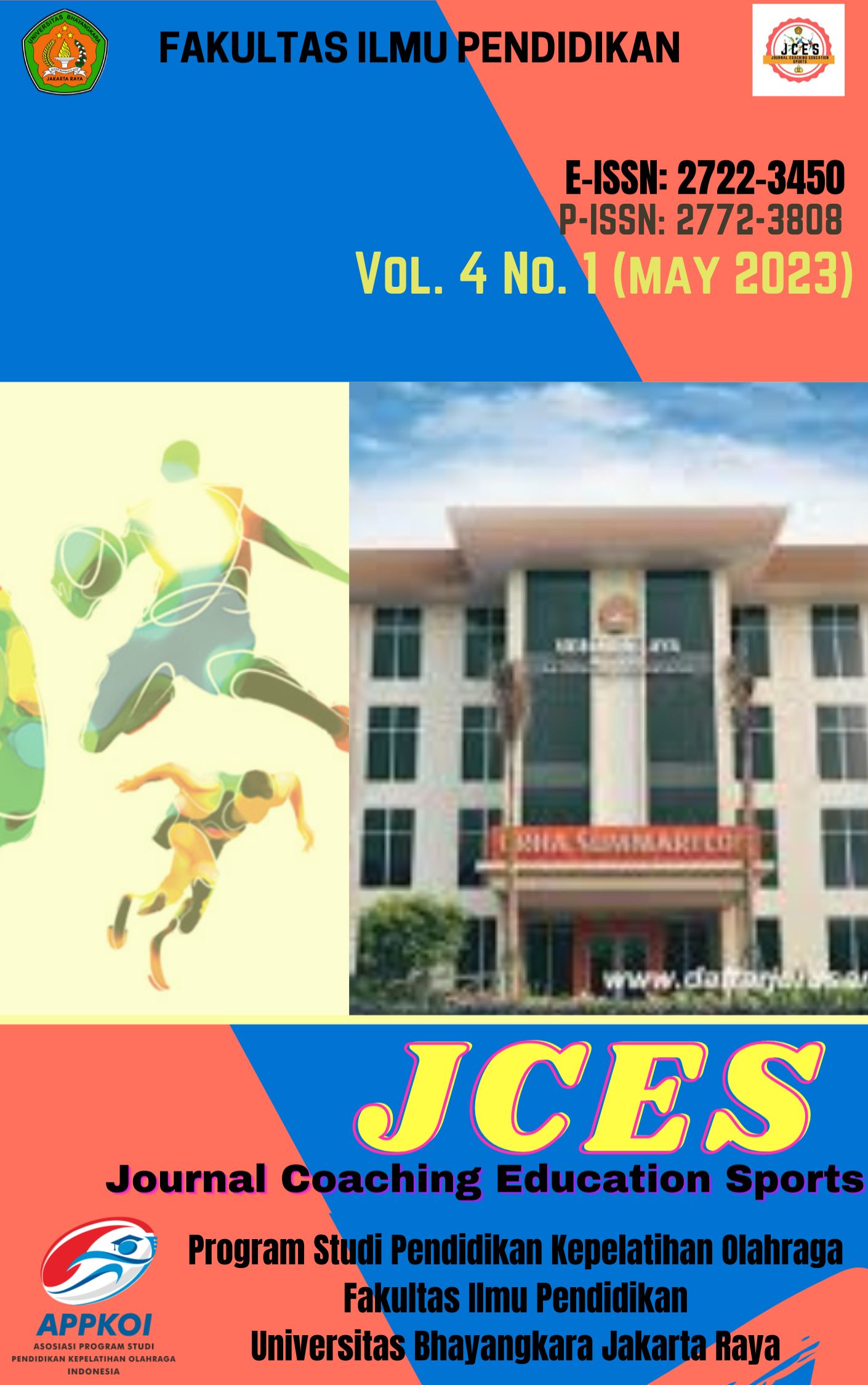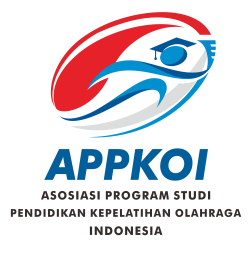Mobile Legend Bang Bang: Level Of Confidence Of E-Sport Athlete
DOI:
https://doi.org/10.31599/fe4z6t05Keywords:
Mobile Legends, Self Confidence, E-SportsAbstract
There are many feelings of not being confident about playing the game in its best condition. Athletes often complain about training or during matches, especially e-sports athletes. This study aims to determine the confidence of MLBB esport athletes. This research is a quantitative descriptive research. The method used in this study was a survey method and data collection techniques using a questionnaire which was distributed via Google form. The population in this study were experienced esport athletes who are domiciled in Bandung, Cimahi and its surroundings. This study uses a convenience sampling technique. The sample of this study was 43 people who were representatives of every sport who agreed and wanted to provide the information needed. The instrument used in this study was a questionnaire on the confidence level of MLBB esport athletes. Data analysis used a descriptive method with percentage calculations. The results of the study show that the confidence level of these MLBB esport athletes is at a high level of 80%. And based on internal factors, MLBB esport athletes are included in the "High" category, while based on external factors, they are included in Moderate. While the results of the analysis of the data obtained by the confidence of esport athletes are not lower at the level of confidence.
Downloads
References
Ahdiyat, M. A., & Irwansyah. (2018).Analisis keterlibatan komunitas dalam industri permainan daring di Indonesia. Interaksi: Jurnal Ilmu Komunikasi, 7(2), 105–115.
Allen, M. S., Jones, M., McCarthy, P. J., Sheehan-Mansfield, S., & Sheffield, D. (2013). Emotions correlate with perceived mental effort and concentration disruption in adult sport performers. European Journal of Sport Science, 13(6), 697–706. https://doi.org/10.1080/17461391.201 3.771381
Alwin, S., Putri, W., & Agustin Hndayani. (2020). Menghadapi Pertandingan Pada Atlet Karate Di Kota Demak Relationship Between Self-Confidence and Emotional Regulation on Anxiety Among Karate Athletes in the City of Demak. 15(1), 88–97.
Aminullah, M., & Ali, M. (2020). PerkembanganTeknologiKomunikasi Era 4.0. Komunike, Volume XII, 1–23.
Bányai, F., Zsila, Á., Kökönyei, G., Griffiths, M. D., Demetrovics, Z., & Király, O. (2021). The moderating role of coping mechanisms and being an e- sport player between psychiatric symptoms and gaming disorder: Online survey. JMIR Mental Health, 8(3), 1–14. https://doi.org/10.2196/21115
Comeig, I., Grau-Grau, A., Jaramillo-Gutiérrez, A., & Ramírez, F. (2016). Gender, self-confidence, sports, and preferences for competition. Journal of Business Research, 69(4), 1418– 1422. https://doi.org/10.1016/j.jbusres.2015. 10.118
Fahlén, J., Eliasson, I., & Wickman, K. (2015). Resisting self-regulation: an analysis of sport policy programme making and implementation in Sweden. International Journal of Sport Policy, 7(3), 391–406. https://doi.org/10.1080/19406940.201 4.925954
Fatahilah, A., & Firlando, R. (2020). Tingkat Konsentrasi Atlet Kota Lubuklinggau. Riyadhoh : Jurnal Pendidikan Olahraga, 3(1), 38. https://doi.org/10.31602/rjpo.v3i1.30 96
Friskawati, G. F. (2021). Self-confidence using technology, understanding of TPACK and teaching quality of physical education’s teacher candidate while online learning. Jurnal SPORTIF : Jurnal Penelitian Pembelajaran, 7(2), 286–302. https://doi.org/10.29407/js_unpgri.v7i 2.15948
Hasmarita, S., & Adha Septiana, R. (2020). Hubungan Kepercayaan Diri dengan Teknik Dasar Grab Start. Jpoe, 1(2),63–72.
https://doi.org/10.37742/jpoe.v1i2.11 Hidayati, K. B., & Farid, M. (2016). Konsep Diri, Adversity Quotient dan Penyesuaian Diri pada Remaja Khoirul Bariyyah Hidayati. Jurnal Psikologi Indonesia, V(2), 137–144. Retrieved from http://jurnal.untag-sby.ac.id/index.php/persona/article/view/730/659
Hong, H. J. (2022). eSports: the need for a structured support system for players. European Sport Management Quarterly, 1–24. https://doi.org/10.1080/16184742.202 2.2028876
Idhohuddin, M., & Wahyudi, A. (2020). Minat Siswa Terhadap E-Sport (Electronic Sport / Olahraga Elektronik) Divisi Mobile Legends Bang-Bang. Indonesian Journal for Physical Education and Sport, 1(1), 41–49.
Jonasson, K., & Thiborg, J. (2010). Electronic sport and its impact on future sport. Sport in Society, 13(2), 287–299. https://doi.org/10.1080/17430430903 522996
Juniasih, T. R. I. E. V. A., Sos, S., & Ap, M. (2017). Persepsi Masyarakat Terhadap Kebijakan Lurah Dalam Penyaluran Raskin (Beras Miskin) Di Kelurahan Kayu Ombun KecamatanPadangsidimpuan Utara Tri Eva Juniasih, S.Sos, M.AP ). Jurnal LPPM UGN, 7(4), 39–46.
Karisman, V. A. (2016). IMPLEMENTASI PENDIDIKAN REKREASI DAN OUTDOOR TERHADAP PERCAYA DIRI MAHASISWA. 15(2), 1–23.
Ke, X., & Wagner, C. (2020). Global pandemic compels sport to move to esports: understanding from brand extension perspective. Managing Sport and Leisure, 1–6. https://doi.org/10.1080/23750472.202 0.1792801
Kurniawan, F. (2020). E-Sport Dalam Fenomena Olahraga Kekinian. Jorpres (Jurnal Olahraga Prestasi), 15(2), 61–66. https://doi.org/10.21831/jorpres.v15i2 .29509
McCauley, B., Nguyen, T. H. T., McDonald, M., & Wearing, S. (2020). Digital gaming culture in Vietnam: an exploratory study. Leisure Studies, 39(3), 372–386. https://doi.org/10.1080/02614367.202 0.1731842
Nacher, V., Garcia-Sanjuan, F., & Jaen, J. (2020). Evaluating Simultaneous Visual Instructions with Kindergarten Children on Touchscreen Devices. International Journal of Human- Computer Interaction, 36(1), 41–54. https://doi.org/10.1080/10447318.2019.1597576
Nugraha, W. H. A. (2021). Minat Masyarakat Terhadap E-Sports Sebagai Olahraga Prestasi Di Jawa Timur. Jurnal Prestasi Olahraga, 04(12), 44–52.
Nusufi, M. (2016). Melatih Konsentrasi Dalam Olahraga. Jurnal Ilmu Keolahragaan, 15(2), 54–61. Retrieved from https://jurnal.unimed.ac.id/2012/index .php/JIK/article/view/6139/5439
Pangarso Wicaksono, A. (2021). Proceeding of Conference on Law and Social Studies Pengakuan Electronic Sports (eSports) sebagai Cabang Olahraga dalam Perspektif Tujuan Hukum Gustav Radbruch. Retrieved from http://prosiding.unipma.ac.id/index.p hp/COLaS
Pasaribu, A. M. N., Candra, J., Kamsurya, R., Zainur, Nurkadri, & Laksana, A. A. N. P. (2021). The relationship of motor skills with performance: Meta- analysis study. Journal Sport Area, 6(3), 315–324. https://doi.org/10.25299/sportarea.20 21.vol6(3).6647
Pramesty, B. I. (2021). Diskriminasi pada Pemain Game Online Perempuan. Jurnal Audience, 4(02), 234–248. https://doi.org/10.33633/ja.v4i2.4498Purnomo, A., & Hariono, A. (2020). Kepercayaan diri pada kemampuan smash tiga meter pada bolavoli Self- confidence due to ability of Three Meter Smash in V olleyball V olleyball is a sport that is played by twelve people on the field , the twelve people are divided into two teams , so each te. Jurnal SPORTIF : Jurnal Penelitian Pembelajaran, 6(2), 541–549.
Purnomo, E., Marheni, E., Jermaina, N., Kunci, K., & Kepercayaan Diri, dan. (2020). Tingkat Kepercayaan Diri Atlet Remaja Self-Confidence Level of Youth Athletes. JOSEPHA Journal of Sport Science and Physical Education, 1(2), 1–7. Retrieved from https://journal.stkippamanetalino.ac.id/index.php/JOSEPHA/index
Radbruch, H. G., & Wicaksono, A. P. (2021). Proceeding of Conference on Law and Social Studies Pengakuan Electronic Sports ( eSports ) sebagai Cabang Olahraga dalam Perspektif Tujuan.
Rahadian, A., Ma’mun, A., Berliana, B., & Nuryadi Nuryadi. (2021). Successful Elite Sport Policies: Indonesia at The 2018 Asian Games. JUARA: JURNAL OLAHRAGA, 6.
Rosell Llorens, M. (2017). eSport Gaming: The Rise of a New Sports Practice. Sport, Ethics and Philosophy, 11(4),464–476. https://doi.org/10.1080/17511321.201 7.1318947
Stabile, B., Grant, A., & Salih, S. (2019). Gendered differences in choice of concentrations in Master of Public Administration programs. Journal of Public Affairs Education, 25(2), 207– 225. https://doi.org/10.1080/15236803.201 8.1565052
Tamba, M. R., & Panday, R. (2021). Pengaruh Bermain Game Dan Game Mobile Legend Terhadap. (January).
Tarigan, D. R. (2020). IMPLEMENTASI PROGRAM PEMBINAAN E- SPORTS DI SMA 1 PERKUMPULAN SEKOLAH KRISTEN DJAKARTA
Wali, C. N., & Widiyanto, W. (2020). Aksiologi esports sebagai olahraga non fisik di Indonesia. Jurnal SPORTIF: Jurnal Penelitian, 6(3), 630–645. Retrieved from https://ojs.unpkediri.ac.id/index.php/p jk/article/view/14926
Yilmaz, T., Top, E., Çelenk, Ç., Akil, M., & Kara, E. (2015). Evaluating the self- confidence levels of teams and individual athletes at the age of 14-16 according to several variables. Studies on Ethno-Medicine, 9(2), 203–207. https://doi.org/10.1080/09735070.201 5.11905436Yoga, S. (2019). Perubahan Sosial Budaya Masyarakat Indonesia Dan Perkembangan Teknologi Komunikasi. Jurnal Al-Bayan, 24(1), 29–46. https://doi.org/10.22373/albayan.v24i 1.3175
Yu, K. G., & Park, S. Y. (2015). Selection and concentration strategy in the sports exchange between North and South Korea. Journal of Asian Public Policy, 8(2), 215–229. https://doi.org/10.1080/17516234.201 4.959249
Downloads
Published
Issue
Section
License
Copyright (c) 2023 Rama Adha Septiana

This work is licensed under a Creative Commons Attribution 4.0 International License.






.png)







